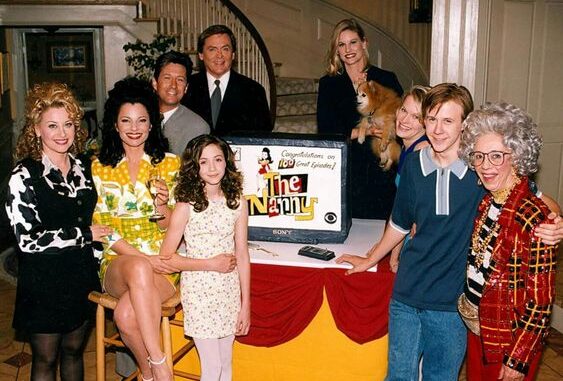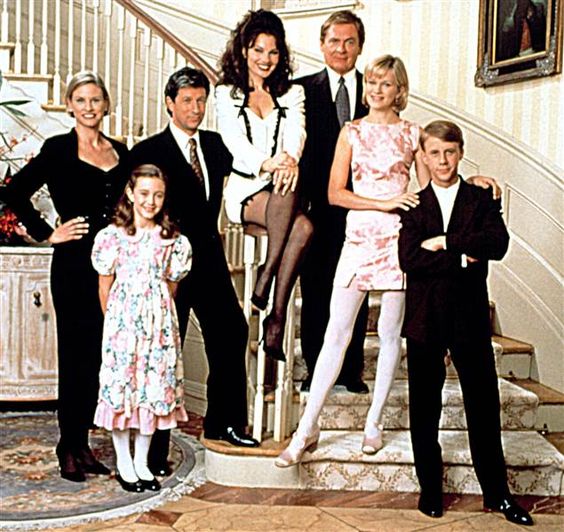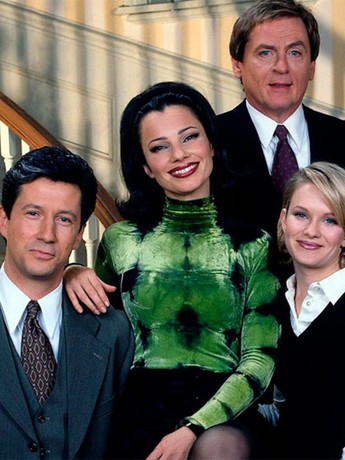
Gay history has to be preserved. It must be preserved and passed down, because our stories—our very existence—is still considered controversial in too many classrooms. The children need to know that our history stretches back further than Alaska winning RuPaul’s Drag Race All Stars Season 2! This is why I have to applaud HBO Max for making a bold move and preserving a foundational piece of gay pop culture, one that’s been left languishing in the obscurity of basic cable reruns for decades. Finally, all six seasons of The Nanny are available to stream for the first time.
The gays who were there know how crucial of a text this show was to generations of us back when the show ran from 1993 to 1999. If we want to draw comparisons—the ’80s had The Golden Girls and the ’90s had The Nanny. But whereas Golden Girls has been able to find younger and younger audiences thanks to Hulu, The Nanny has been relegated to deep cut reference territory, surfacing only when a queen does a middling job of impersonating Fran Drescher on “Snatch Game.” No more. The Nanny is on HBO Max, and it is time for this show to shine.
I’m not being hyperbolic, either! I mean, as a gay pop culture writer, yes, I’m fluent in hyperbole. But after spending a weekend bingeing over 30 episodes of The Nanny spread across all six seasons, I’ve been reminded of just how thoroughly essential, revelational, and vital this show was—and is!—to the gay experience. It truly felt like an even gayer part of me was reactivated after years of dormancy by the sound of one nasal laugh. What I realized is that, while I did not watch The Nanny religiously when it was on (we were a TGIF and then Must See TV family), the show still managed to add a lot of gay wrinkles to my elementary-to-middle school brain. Let’s look at the material. Why did this show appeal to all the gays, from the out and proud activists all the way down to one entirely clueless baby gay in Tennessee?
The biggest reason is Fran Fine herself. With her distinct voice, party girl fashion, and unflappable confidence, she’s the ideal outsider. She’s a Jewish woman from Queens dropped in a WASP’s nest in upper crust Manhattan, yet it never phases her. She never tones down her wardrobe, she never loses her accent, she never misses a sale or skips a tradition. That’s the vibe that every gay man dreams of—to be able to go where you want to go without having to compromise your authentic self. How many of us have had to watch what we wear, censor what we say, and hide who we love based on which job we have or which state we may be stopping in for gas? Fran Fine is the ultimate, uncompromising gay ideal—and, without realizing it, I related to her in middle school because everyone had figured out that I was gay long before I did, and they held it against me.
Let’s focus on the fashion for a second, because Nanny Fine’s wardrobe is worth its own dissertation.
Every single look is meticulously curated (by Emmy-winning stylist Brenda Cooper), and every single look is worth studying (and it has been!). But Fran’s wardrobe is itself a metaphor for the gay experience. She’s always perceived as garish or tacky or inappropriate. The show’s villains look down at Fran because of what she wears. But, as The Fran Fine Fashion Database reveals, all of these looks are designer.
We’re talking Moschino, Chanel, Bob Mackie, Todd Oldham, Thierry Mugler—these are the labels that all those snobs covet, and they’re too snooty to realize that Fran has better taste than them, better style than them, and more confidence than them. She’s perceived as low-class, but if you actually look at her, you see that she is rich in personality and humanity. Hello, metaphor!
Also I swear—if Drag Race does not do a Nanny-inspired runway category and bring Fran Drescher on as a guest judge in one of the next few seasons, we riot.
There’s also big gay vibes from the pop culture that Fran herself takes in. The woman is a sitcom fanatic.
This is—and I’m sure every Gen X and old millennial gay will agree—representation, honey. The Nanny is itself a straight-up, jokes-first, classic sitcom that wears its influences proudly on its tie-dyed sleeve. Like so many of us, Fran is pop cultured.
It’s how she relates to the world, and it’s a world that feels like home to her. Hard same, Fran, and this is something that WandaVision really hit home just a few months ago. Not only did that show use sitcom history to inject much needed queerness into the MCU, it also treated this oft-maligned art form as the groundbreaking, important art that it is (and has always been).
Just because we find value in different art forms does not make them any less valuable or us any less intelligent.
But can we talk about the comedy? The Nanny stands the test of time because it is unapologetically funny.
The variety and speed with which The Nanny rattles off jokes is quite frankly remarkable and way more in line with comedies of today. The Nanny walked so Veep could run? I’m not not saying that! The only show with the same rhythms, the same joie de vivre as The Nanny is really The Golden Girls. Both shows pack in punchlines while never skimping on heartfelt moments. It’s a wacky balance, and these shows pull it off.
This comedy is big and bold—every zinger feels like it should be coming from a Vegas stage or the center square. That style of comedy is inherently gay. We’ve always used humor to mask hurt or show our hearts. It’s like gays learned that while we may not be able to get the love we want from the public, we can settle for getting the laughs—so we get them by any means necessary. Now I know why I subconsciously needed that “wittiest” senior superlative back in high school (I got it, BTW :sunglasses emoji).
And the physical comedy? These are what RuPaul’s Drag Race acting challenges wishes they could be.
Fran Drescher is legitimately a Lucille Ball-level marvel when it comes to physical comedy. The Nanny never holds back.
That all brings us to the intensely personal portion of this big, gay essay: Daniel Davis.
Niles, the quick-witted and fastidious butler. Sam Neill was my first ever crush, and y’know, Daniel Davis was probably my second. Other closeted gays had Jonathan Brandis, I had Niles. What does it say about me, that at the age of 10 I would watch The Nanny and find myself just wanting to look at the dapper, snarky butler because I liked his whole vibe… a lot and in that way? What does it say about me that I’ve spent much of my 30s becoming even more obsessed with formalwear and cardigans and the increasingly frequent pinky ring?
I don’t care that Niles is “straight.” I don’t care that I can find no actual confirmation from Davis himself that he is, in fact, a homosexual (yes, I desperately want to add him to my list of gay heroes and if this article gets in front of his still-handsome face, HELLO and THANK YOU!). To be honest, Niles and C.C.’s whole relationship has a real lavender marriage vibe to it—and I actually dig it when viewed through that lens. But whatever—with his iconic punchlines, uptight sass, impeccable wardrobe, Niles was the archetypal gay that I would subconsciously grow into (even if… I mean, I’m a 60/40 Fran/Niles split). This man playing this character on this TV show made an impact on me that I could not fathom at the time, and it really became clear to me when I realized that this joke has stayed with me, buried in my memories, for 26 years:
The brain files away certain things for a reason.
I bring up my childhood infatuation with Niles (a sentence I have been waiting to write on this website for years) because I feel like every young and/or closeted gay had a similar experience with The Nanny. The show spoke to you in a way you did not understand at the time—but it felt right. Whether you had a crush on Mr. Sheffield or recreated Fran’s looks using whatever you could find around the house or just dreamed of a time when you could be fully accepted for being yourself, The Nanny mattered and matters.
For all of these reasons, broad and incredibly narrow, The Nanny is one of the most crucial texts in the gay library. I’m so glad that HBO Max has done the good deed of putting it back on the shelf for everyone—and I mean everyone—to enjoy. Please, please check it out. The Nanny is gay rights.
